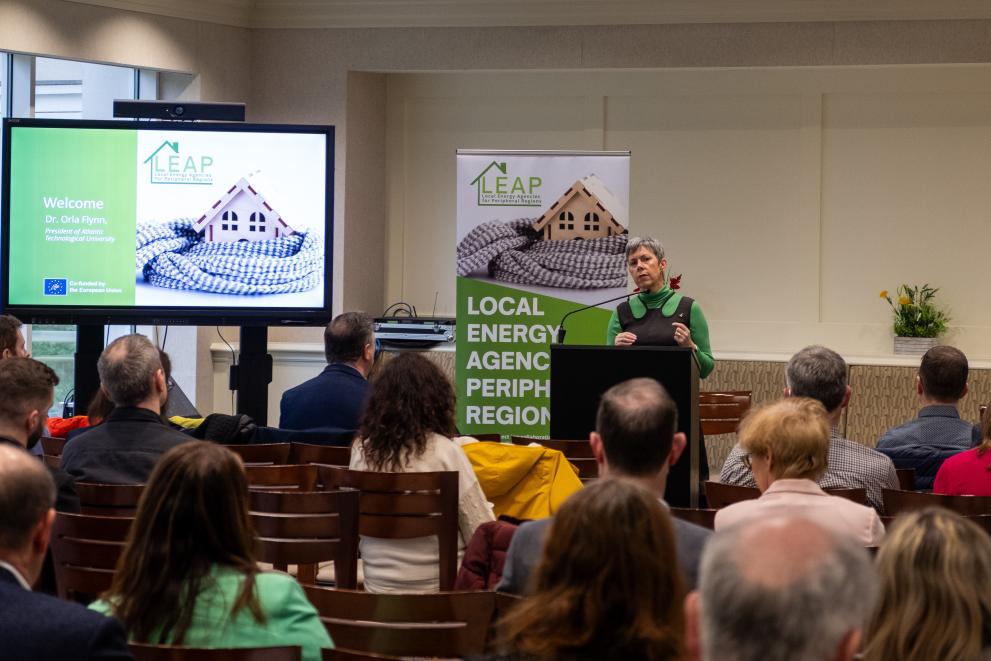
Ireland is not known for its summer heat, and even with climate change, it may not ever experience sweltering summer months, and dangerous heatwaves. But the country is ill-prepared in its resilience to deal with energy generation, water resources, and ageing infrastructure. Factors such as remote, dispersed, and older homes, a high reliance on oil and solid fuels, and fragmented or sparse supply chains exacerbate already high living costs and the heating of homes. Not to mention the fact that retrofitting homes is confusing and expensive.
Ireland set out key climate targets in its Climate Action Plan in 2021, with a goal of a 51% reduction in greenhouse gas emissions by 2030, and net zero by 2050. One target is to retrofit 500 000 homes by 2030. The latest Census showed Ireland has just over 2 million permanent homes. While government financial support is available and improving, homeowners hold the purse strings to reaching this goal.
LIFE Local Energy Agencies for Peripheral Regions, or LIFE LEAP – part of the LIFE Clean Energy Transition programme – is supporting homeowners in Donegal, Sligo, Leitrim, and west county Galway with retrofitting their homes and creating partnerships with local suppliers. In the most northerly county, Donegal, winter temperatures oscillate between 2 and 3 degrees Celsius, with frequent heavy rains. Retrofitting homes is a matter of resilience. LIFE LEAP has created three Local Energy Agencies to support homeowners – North West Energy Agency (NWEA), Gníomhaireacht Fuinnimh an Iarthar (GFI), and Sligo Leitrim Energy Agency (SLEA). Over four years, the agencies will serve as one-stop shops, helping communities navigate building upgrades and supply chains in their areas. By working with the local supply chain across building energy assessors, retrofit contractors and installers, they will also create partnerships across home renovation services.
Lead by Atlantic Technological University (ATU), with partners County Councils of Sligo, Leitrim, and Donegal, Údarás na Gaeltachta, and Aran Island Energy Co-op, LIFE LEAP will create a continuous pipeline of neighbourhood-based projects. Its cause: all homeowners should have the opportunity to invest in making their homes warmer, cheaper to heat and more valuable.
Speaking on the project’s impact on homeowners, “Prior to start of the agency, there was no place for people to go to. Now people can come to us, and we can advise them on how to retrofit their homes. We will be able to work with homeowners to give them a pathway into the future to achieve a higher Building Energy Rating (BER). We are grateful for the continued help of the EU LIFE Programme to make it possible to aid fuel poor and non-fuel poor homes,” said Paraic Barret, Manager at GFI.
Adding how the project is sharing its expertise, “The project is currently focused on developing an area based retrofit programme, in conjunction with the Sustainable Energy Authority of Ireland. The LEAP Project is very welcome and is providing real learning,” noted Aidan McGrenra, Manager from NWEA.
Commenting on the importance of grants, “SLEA is in progress of successfully delivering a pipeline of area-based home upgrades/retrofitting projects, with up to 63 homes allocated since September 2023 under the Better Energy Warmer Homes Scheme (SEAI). We continue to strive to work closely with communities through SEAI Community Energy Grant Scheme,” concluded Barry Lowe, Manager at SLEA.
LIFE LEAP aligns to a series of EU Directives, including: Energy Efficiency; Ambient Air Quality; Renewable Energy; and Energy performance of buildings. Addressing energy poverty is a key element of the European Green Deal.
Details
- Publication date
- 10 April 2024
- Author
- European Climate, Infrastructure and Environment Executive Agency

